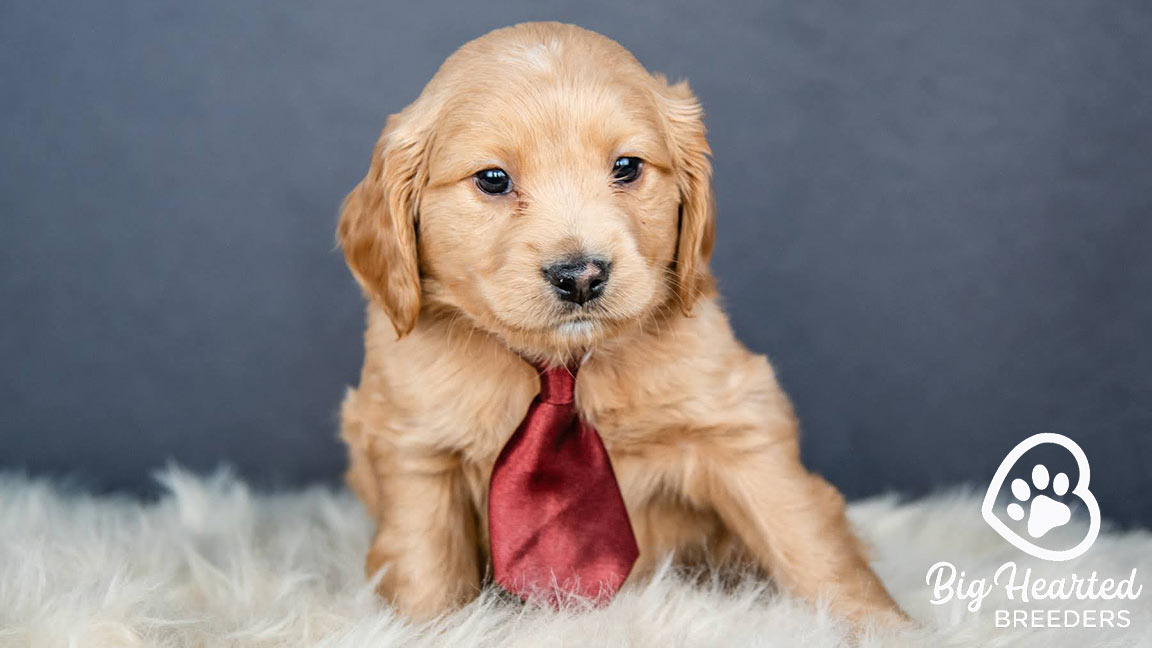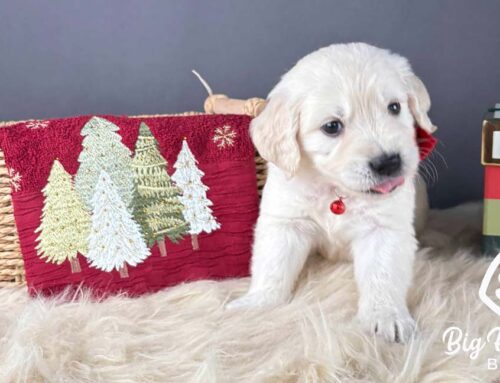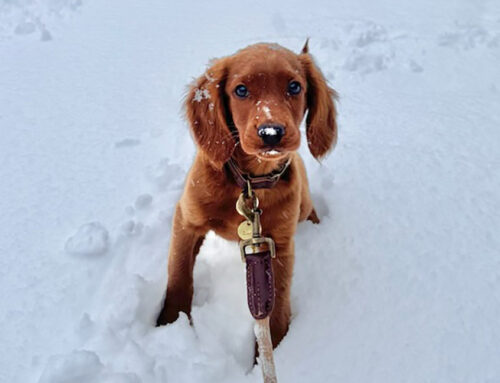How to Stop Puppies from Biting: Breeder’s Guide
How to Stop Puppies from Biting: Breeder’s Guide
Puppy biting is one of the most common challenges new owners face. But learning how to stop puppies from biting effectively takes more than just a loud “no.” At Big Hearted Breeders, we raise our mini golden retriever puppies from birth, focusing on early socialization, bite inhibition, and emotional development. This provides families with a strong foundation before their puppy comes home.
This guide covers the developmental reasons behind biting, eight proven training methods, and age-appropriate strategies to stop biting behavior while building trust and healthy habits that last a lifetime.

Why Puppies Bite in the First Place
Before learning how to stop puppies from biting, you need to understand why they do it.
- Teething discomfort (from 3 to 6 months) causes pups to chew to relieve pain.
- Social learning starts in the litter, where puppies learn bite pressure through feedback from siblings and mom.
- Exploration and communication happen through their mouths, it’s how puppies learn about the world.
- Breed tendencies matter. Mini golden retrievers are gentle and eager to please, but their retriever instincts mean they love using their mouths.
At our facility, we begin bite inhibition training as early as 4 weeks old using gentle redirection and early social cues. But puppies still need continued support in their new homes.
8 Proven Methods to Stop Puppy Biting
1. Mimic Natural Bite Inhibition
When your puppy bites too hard, immediately stop play and turn away, just like another puppy would do. This teaches that hard bites make the fun stop. No shouting, just clear cause and effect.
We start this early in our breeding program, so many of our puppies already have a basic understanding of gentle mouthing before they go home.
2. The “Ouch” Method (If It Works)
Some puppies respond well to a high-pitched “ouch” followed by stopping interaction. Others get more excited. If your puppy gets more bitey after hearing it, skip the sound and go straight to silent withdrawal.
Consistency across the whole family is key here: how to stop puppies from biting requires the same response from everyone in the house.

3. Redirect to Toys
Keep chew toys and textured options (like rope, rubber, or frozen treats) nearby. When your puppy starts to nip, offer the toy instead. Praise the switch. Timing matters; redirect before your puppy gets too excited.
We introduce toy training early, so our puppies learn that toys, not fingers, are the right things to chew.
4. Use Short Time-Outs
If biting persists, calmly guide your puppy to a crate or gated space for 1–2 minutes. No yelling. Just a chance to reset. Then resume calm play.
Remember: how to stop puppies from biting is not about punishment, it’s about teaching impulse control through brief, low-drama resets.
5. Manage Energy and Emotions
Biting often spikes when puppies are overtired, overstimulated, or under-exercised. Short walks, training sessions, puzzle toys, and nap time help balance energy levels. A tired puppy is a less bitey puppy.
6. Structure Your Home for Success
Puppy-proof your environment. Keep off-limits items out of reach and poisonous plants and foods away. Provide lots of approved outlets for chewing and build routines around meals, potty breaks, play, and rest. A calm, structured home makes it easier to teach how to stop puppies from biting without chaos.

7. Reward Gentle Behavior Immediately
Catch your puppy doing the right thing, soft mouthing, calm behavior, or appropriate chewing, and reward it immediately with treats or praise. The faster the reward, the better your puppy connects the dots.
8. Keep the Whole Family Consistent
Everyone should follow the same rules. Kids need extra guidance, since squeals and rough play often escalate biting. Set house rules, supervise interactions, and review what’s working (or not) at regular family “puppy check-ins.”
Age-Specific Biting Advice
8–12 Weeks: Gentle Foundations
Your puppy is learning everything for the first time. Use this window to build trust with soft correction and reward-based redirection. Begin teaching simple commands like “sit” and practice gentle handling around their mouth.
3–4 Months: Teething and Troubleshooting
This is peak teething time. Provide frozen toys and add more frequent breaks during training. If biting increases, it’s likely due to sore gums, not bad behavior. Stay patient, redirect, and keep up with praise for appropriate chewing.
4–6 Months: Reinforcing Consistency
As adult teeth emerge and your puppy gains confidence, you might see boundary testing. Stay the course with your training plan. Biting should reduce significantly with consistent redirection and daily mental stimulation.
We’ve seen occasional regressions, like with a five-month-old pup who suddenly returned to intense nipping after doing great for weeks. After increasing puzzle toys and cutting back on rough play, the behavior vanished in days.
Real Success Stories

Max: The Overstimulated Explorer
Max didn’t respond to typical training. He’d wait by the door, go outside, then come back in and bite. We discovered he was overstimulated outdoors. His family started leashing him to the potty area and limiting distractions, and the biting vanished.
Bella and Cooper: Littermates Learning Together
Bella learned faster. Cooper watched. Once Cooper saw Bella getting treats for gentle behavior, he copied her. By the end of week two, they were both biting less and sitting more.
How to stop puppies from biting often involves discovering the “why” behind the behavior, and tailoring your strategy.
What We Do at Big Hearted Breeders
Our puppies receive bite inhibition training starting at four weeks, with structured play, early handling, and gentle redirection. We also:
- Provide teething toys early
- Match puppies to families based on temperament
- Share custom training advice at pickup
And if you want extra help, we offer puppy training packages that cover everything from crate training to leash work, based on your pup’s age and personality. It’s all positive, personalized, and rooted in real-life experience.
When to Seek Help
Most biting decreases with consistent home training, but seek a professional if your puppy:
- Bites harder over time
- Growls when touched
- Shows resource guarding
- Is still biting excessively after 6 months
Choose trainers who use positive reinforcement, not dominance-based methods.
Frequently Asked Questions
Is puppy biting normal?
Yes. It’s a natural part of development and exploration, not aggression.
When should I start bite training?
As early as 8 weeks. Our puppies begin at 4 weeks while still with their litter.
Why does my puppy bite more at night or when tired?
Tired puppies lose impulse control. Stick to a nap schedule and avoid overstimulating them.
How to stop puppies from biting family members but not strangers?
Train consistently at home first. Supervise all greetings. Reward calm behavior with new people.
Do some breeds bite more than others?
Some, like herding breeds, nip more. Retrievers love using their mouths. But all dogs can learn bite inhibition with the right training.
Final Thoughts
Learning how to stop puppies from biting means more than stopping bad habits. It’s about building communication, teaching boundaries, and creating a bond of trust.
With the right tools, a calm environment, and a consistent training plan, your puppy will grow into a gentle, well-mannered companion you’ll be proud of for years to come.
At Big Hearted Breeders, we’re here to help before and after your puppy comes home.





